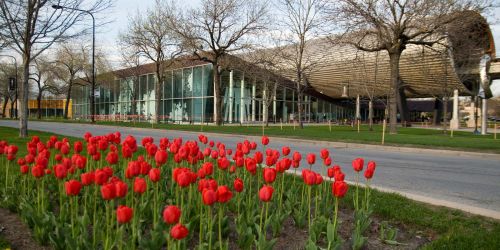
Coronavirus (COVID-19)
This website contains up-to-date information regarding university plans and policies as well as important information regarding COVID-19 from government authorities.
Confronting COVID-19-Related Harassment in Schools A Resource for Families
University Plan for Reopening from COVID-19 (myIIT login required)
Illinois Tech COVID-19 Contact Information
- contactTracing@iit.edu
- Contact Tracer Hotline: 872-216-7440
- COVIDconcerns@iit.edu
At Illinois Tech our top priority is always the health, well-being, and support of all our community members. As public health officials continue to monitor developments regarding the coronavirus (COVID-19), university leaders are working closely with the Chicago Department of Public Health (CDPH) to actively monitor and plan for contingencies on a day-to-day, hour-to-hour basis.
—Alan W. Cramb, President, Illinois Institute of Technology
This website contains up-to-date information regarding university plans and policies as well as important information regarding COVID-19 from government authorities.
Hawks 4 Hawks Hardship Fund
Contribute to the Hawks 4 Hawks Fund which provides direct financial assistance to Illinois Tech students in crisis situations. 100% of funds are directed to helping students facing unexpected hardships, such as meeting the cost of housing or travel assistance. Make a contribution today!
Fully Vaccinated Individuals
Fully vaccinated people who have been in close contact with someone who is sick but are fully vaccinated, do not need to quarantine as long as they remain without any symptoms of COVID-19. If you develop symptoms of COVID-19, you should isolate and be evaluated by a medical provider. All vaccinated individuals still need to follow other COVID-19 public health measures, such as masking, social distancing, and washing their hands. A person is "fully vaccinated" when it has been more than 2 weeks following receipt of the second dose in a two-dose COVID- 19 vaccine series or more than 2 weeks following receipt of 1 dose of a single-dose COVID-19 vaccine.
University Travel Policy
The City of Chicago has recently updated its Emergency Travel Order and quarantine guidelines to account for the increasing number of vaccinated persons throughout the region. In general, this new set of guidelines doesn’t require fully vaccinated individuals to follow the same guidelines as those who have yet to receive the vaccine.
Below you will find the precise criteria as outlined and defined by the Chicago Department of Public Health:
1. Quarantine after exposure -- Vaccinated persons who are a close contact to a confirmed COVID-19 case are not required to quarantine if they meet all of the following criteria:
- Are fully vaccinated (i.e., are ≥2 weeks following receipt of the second dose in a two-dose COVID-19 vaccine series or ≥2 weeks following receipt of one dose of a single-dose COVID-19 vaccine).
- Have remained asymptomatic since their last contact with the infected person; and
- Are not inpatients or residents in a health care setting.
2. Quarantine after travel -- Vaccinated persons (returning travelers who live or work in Chicago, or visitors to Chicago) who have traveled domestically are not required to quarantine if they are:
- Asymptomatic; and
- Fully vaccinated (i.e., are ≥2 weeks following receipt of the second dose in a two-dose COVID-19 vaccine series or ≥2 weeks following receipt of one dose of a single-dose COVID-19 vaccine).
Again, people who are not fully vaccinated (i.e., are ≥2 weeks following receipt of the second dose in a two-dose COVID-19 vaccine series or ≥2 weeks following receipt of one dose of a single-dose COVID-19 vaccine) must continue to quarantine as required by the Emergency Travel Order.
University Coronavirus (COVID-19) Contact Policy
If a student, faculty or staff member believes they are sick with COVID-19 symptoms, university policy requires that they either (i) get tested and self-quarantine until they have received their test results, or (ii) remain in self-quarantine for 10 days from the date of symptom onset. (A student, faculty or staff who tests positive must self-isolate for 10 days.) Accordingly, students, faculty or staff members who have tested positive for COVID-19, been in contact with someone who has tested positive, or are experiencing COVID-19 symptoms should not attend class or work until they have satisfied either criteria (i) or (ii) above. In such circumstances, students are expected to work with their professors to request extensions on coursework and/or to reschedule exams if their illness impacts attendance, the ability to participate in the course, and/or the ability to complete assignments and exams as per the established schedule.
Watch On-Demand: Webinar on New Safety Guidelines for Re-opening IFSH Labs
Illinois Tech’s Institute for Food Safety and Health (IFSH) hosted a special webinar on “Workplace Safety Considerations During an Emergent Infectious Disease” on April 23.
The online seminar is available here on-demand, and features a behind the scenes walk-through of the decision-making and strategies used in developing new safety guidelines for re-opening IFSH labs for critical work during a novel viral pandemic.
Featured Speakers
Deena Awad, Senior Support Scientist, Microbiology, IFSH
Awad has a degree in Food Science with a focus on Food Microbiology from Michigan State University, where she worked in aflatoxin research as an undergraduate. She comes to the Illinois Tech side of IFSH after almost five years with FDA as an ORISE Fellow focusing on leafy greens and sprouts safety research. In her free time, Deena works with shelter dogs and runs the Big Dog Program for a Chicago-area dog rescue.
Yun Wang, Ph.D., Senior Scientist/Biosafety officer, IFSH
Yun Wang is currently a Senior Scientist and Biosafety Officer at the Institute for Food Safety and Health. She was a Research Biochemist at U.S. Food and Drug Administration from 2013 to 2019. She received her Ph.D. in Biosystems Engineering from the Michigan State University in 2014. The major goal of her research is to ensure public health through novel detection and diagnosis approaches. Her research mainly focuses on pathogen and toxin detection, rapid disease diagnosis, and genetic study of food-borne pathogens.


